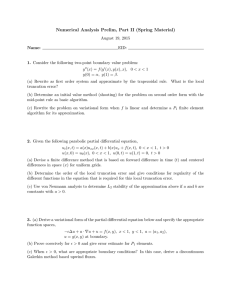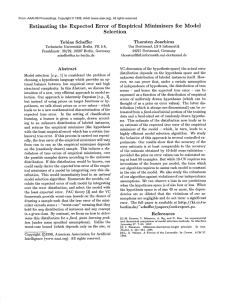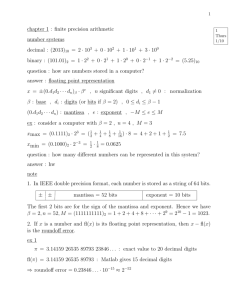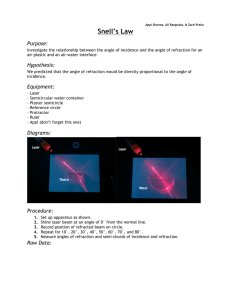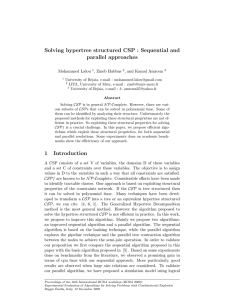Drawing Lines The Bresenham Algorithm for drawing lines and filling polygons
advertisement
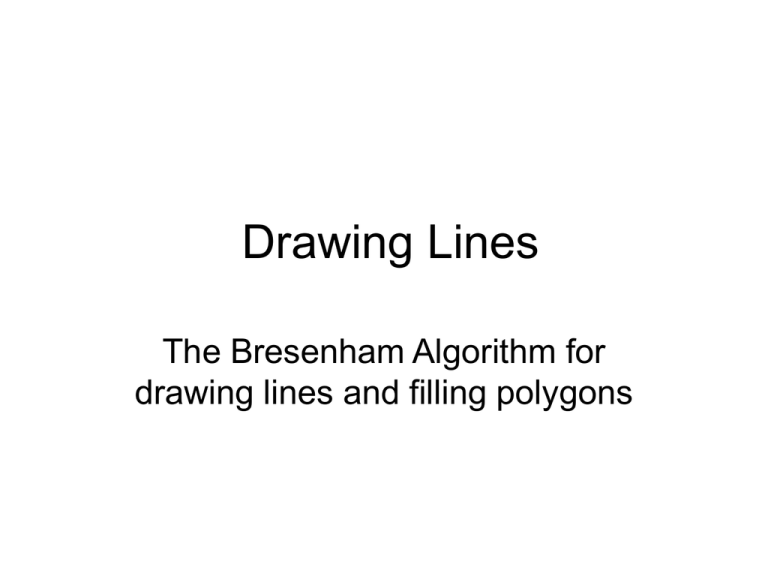
Drawing Lines
The Bresenham Algorithm for
drawing lines and filling polygons
Plotting a line-segment
•
•
•
•
•
Bresenham published algorithm in 1965
It was originally to be used with a plotter
It adapts well to raster “scan conversion”
It uses only integer arithmetic operations
It is an “iterative” algorithm: each step is
based on results from the previous step
• The sign of an “error term” governs the
choice among two alternative actions
Scan conversion
The actual line is comprised of points drawn from a continuum,
but it must be “approximated” using pixels from a discrete grid.
The various cases
• Horizontal or vertical lines are easy cases
• Lines that have slope 1 or -1 are easy, too
• Symmetries leave us one remaining case:
0 < slope < 1
• As x-coodinate is incremented, there are
just two possibilities for the y-coordinate:
(1) y-coordinate is increased by one;
or (2) y-coordinate remains unchanged
0 < slope < 1
Y-axis
X-axis
y increases by 1
y does not change
Integer endpoints
ΔY = Y1 – Y0
ΔX = X1 – X0
(X1,Y1)
0 < ΔY < ΔX
ΔY
(X0,Y0)
ΔX
slope = ΔY/ΔX
Which point is closer?
A
yi -1+1
yi -1
B
xi -1
y = mx + b
ideal line
xi
error(A) = (yi -1 + 1) – y*
error(B) = y* - (yi -1)
The Decision Variable
• Choose B if and only if error(B)<error(A)
• Or equivalently: error(B) – error(A) < 0
• Formula: error(B) – error(A) =
2m(xi – x0) + 2(y0 – yi -1) -1
• Remember: m = Δy/Δx (slope of line)
• Multiply through by Δx (to avoid fractions)
• Let di = Δx( error(B) – error(A) )
• Rule is: choose B if and only if di < 0
Computing di+1 from di
di+1 = 2(Δy)(xi+1 – x0) +2(Δx)(y0 – yi) – Δx
di = 2(Δy)(xi – x0) + 2(Δx)(y0 – yi-1) – Δx
The difference can be expressed as:
di+1 = di + 2(Δy)(xi+1 – xi) – 2(Δy)(yi – yi-1)
Recognize that xi+1 – xi = 1 at every step
And also: yi – yi-1 will be either 0 or 1
(depending on the sign of the previous d)
How does algorithm start?
• At the outset we start from point (x0,y0)
• Thus, at step i =1, our formula for di is:
d1 = 2(Δy) - Δx
• And, at each step thereafter:
if ( d i < 0 ) { di+1 = di + 2(Δy); yi+1 = yi; }
else { di+1 = di + 2(Δy-Δx); yi+1 = yi + 1; }
xi+1 = xi + 1;
‘bresdemo.cpp’
• The example-program is on class website:
http://nexus.cs.usfca.edu/~cruse/cs686/
• It draws line-segments with various slopes
• The Michener algorithm (for a circle-fill) is
also included, for comparative purposes
• Extreme slopes (close to zero or infinity)
are not displayed in this demo program
• They can be added by you as an exercise
Filling a triangle or polygon
•
•
•
•
•
The Bresenham’s method can be adapted
But an efficient data-structure is needed
All the sides need to be handled together
We let the y-coordinate steadily increment
For sides which are “nearly horizontal” the
x-coordinates can change by more than 1
Triangle Illustration
Non-Convex Polygons
Bucket-Sort
Y
0
1
2
3
4
5
6
7
8
10
11
12
13
XLO
8
7
6
5
7
XHI
8
9
10
11
12
9
13
11
14
13
15
15
16
17
17
Handling Corners
In-class exercises
• For the ‘bresdemo.cpp’ program:
– Supply a function that tests the capability of
the Breshenham line-drawing algorithm to
draw lines having the full range of slopes
• For the ‘fillpoly.cpp’ program:
– Modify the program code so that it will work
with polygons having more than three sides
